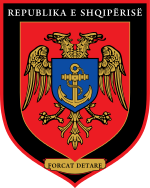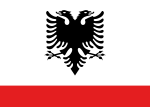Albanian Naval Force
| Albanian Naval Forces | |
|---|---|
| Forca Detare | |
 | |
| Founded | 1925 |
| Country | |
| Type | Navy |
| Part of | Albanian Armed Forces |
| Anniversaries | 25 December – Navy's Foundation Day |
| Equipment | 1,000 personnel and 19 patrol vessels |
| Commanders | |
| Chief of the General Staff | Major General Arben Kingji |
| Commander of the Naval Force | Counter Admiral Adnand Agastra |
| Insignia | |
| Naval ensign[1] |  |
The Albanian Naval Force (Albanian: Forca Detare të Republikës së Shqipërisë) is the naval branch of the Albanian military. Their name was changed from the Albanian Naval Defense Forces in 2010.[2] The Naval Force is headquartered in Durrës, and operates multiple bases, including Kepi i Palit base in Durrës, and Pashaliman in Vlorë.
The vessels of the Albanian Naval Force are mostly patrol craft and support craft. The Naval Force operates four large Damen Stan Type 4207 patrol boats, three of which were built in Albania.[3] Some of the Naval Force's vessels were purchased from, or donated by Italy, the United States, China, or the Soviet Union. Most former Soviet or Chinese boats have been retired from service; only one Soviet-built minesweeper remains in service.
The Naval Force performs mainly duties, based on the concept of "one Force, two Missions". The legal framework has been updated in order to facilitate these missions and EU-NATO integration. The Naval Force is also responsible for aids to navigation, including lighthouses.[4]
History
[edit]Early history
[edit]The history of the Albanian navy dates back to the General Command of Military Powers in 1925, following the creation of the Albanian Republic. Earlier efforts to create an Albanian naval force following Albanian independence in 1912 failed due to the start of World War I. In this period Albania possessed few naval vessels. Following the establishment of the Albanian Kingdom by King Zog in 1928, the navy was reformed into the Royal Albanian Navy.[5]
Following the Italian invasion of Albania and World War II, the Albanian Armed Forces were abolished and many ships were destroyed in the harbors of Albania.[6]
During the Socialist Era
[edit]The early history of the People's Socialist Republic of Albania saw Albania recovering from the result of Italian occupation and World War II. In 1945, a shipyard was built in Durrës to repair Albania's remaining ships.[5]
In the mid-1950s Albania began to modernize and expand its navy. In 1954, a torpedo boat unit and the associated facility was established on Sazan Island, off the coast of Vlorë. A submarine unit was established in 1958. A naval academy was opened in Vlorë in 1961.[5]
The Albanian Navy, as of 1986, operated around 50 small warships and 12 service vessels, with a workforce of approximately 3,200. Their largest combatants were a couple of ex-Soviet Whiskey-class submarines, although these were primarily out of service due to a shortage of spare parts. An additional Whiskey was utilized as a battery charging station or, according to some sources, as a harbor training boat. The offensive power of the navy was derived from six Shanghai-II-class gunboats and 32 45-ton Huchuan-class hydrofoil torpedo boats. Antisubmarine capability was limited to two aged ex-Soviet Kronstadt-class submarine chasers of 330 tons.[7]
In terms of mine warfare, the navy had two ex-Soviet T-43-class ocean minesweepers and six T-301-class inshore minesweepers, all held in reserve. Only two T-301s have been (barely) operational since 1979. The auxiliary force comprised an ex-Soviet Khobi-class coastal tanker and a Toplivo-class yard tanker. There was no naval aviation or coastal defense capability. Nevertheless, the Albanian Army had three artillery battalions safeguarding the entrances to naval bases and several commercial ports at that time.[7]
The largest of the fleet were four Soviet-built Whiskey-class submarines, a direct result of an Albanian-Soviet dispute over their ownership, after Albania withdrew from the Warsaw Pact (1961) and the Soviets abandoned the Pasha Liman Base. The submarines were put into full service thanks to Chinese assistance, but by the end of the 1980s their efficiency was in doubt due to Albanian isolation and the end of Chinese help.[citation needed]
- Naval ensigns (1946–1992)
-
Naval Ensign (1946–1954)
-
Naval Ensign (1954–1958)
-
Naval Ensign (1958–1992)
- Other ensigns (1946–1992)
-
State Ensign (1958–1992)
-
Coast Guard Ensign (1958–1992)
Recent history
[edit]The collapse of the People's Socialist Republic of Albania began in the early 1990s and was finalized with the 1992 elections and the founding of the 4th Albanian Republic. The fall of communism in Albania ushered in a new era of cooperation between the navies of Albania and other European nations. Starting in the 1990s, Albania began to take part in numerous search and rescue exercises alongside other European nations.[5]
Vessels of the Albanian navy were seriously damaged during the 1997 political conflict. In March 1998, the Albanian Navy docked in Italy for repair and refuge. The Naval Force's facilities were also damaged in the conflict and repairs were made with the help of the United States, Italy, Germany, Greece, Turkey, and other countries. In the same year, Albania retired its four Whiskey-class submarines.[5]
As a result of numerous agreements made between 1998 and 2004, Albania received donated patrol vessels from the United States and Italy for use in search and rescue operations. The United States donated five boats in 1998, Italy donated six boats in 2002, and Italy donated another five in 2004.[5] In 2004, Albania entered into an agreement with Italy wherein the Italian Navy provided equipment and technical assistance to the Albanian Naval Force in order to upgrade the country's aids to navigation.[4]
In June 2007, Albania renamed and reorganised its navy. The newly named Naval Force was thereafter organised into two flotillas and a logistics battalion.[5]
Facilities
[edit]
The Naval Force operates multiple bases, including Kepi i Palit base in Durrës, and Pashaliman in Vlorë. In the past, the Naval Force operated additional facilities including Porto Palermo, outside of Himarë, a submarine base on Sazan Island, and a base in Shëngjin.[8]
Pashaliman
[edit]Pashaliman Naval Base, located near Vlorë, has been used by the Albanian Navy from the 1950s. In that time it was one of few naval bases in the Mediterranean. Currently, four retired Whiskey-class submarines previously owned by the Soviet Union are still located on the facility alongside Albania's active-duty naval vessels. Three of the Albanian Navy's four Illiria-class patrol vessels were built at Pashaliman, the most recent completed in 2014.[3]
The Naval Force often operates naval exercises in the Bay of Vlorë, out of Pashaliman. The most recent exercise was in April 2016.[9]
A civilian naval engineering firm and shipyard also operate out of the military facility at Pashaliman.[10]
Porto Palermo
[edit]The Albanian Navy previously operated a submarine bunker called Porto Palermo, which was shut down after the decommissioning of Albania's submarines. In recent years, Porto Palermo has been used as the site of training exercises with foreign militaries, including a joint exercise with the United Kingdom.[11]
Structure
[edit] Naval Force, in Durrës[12][13]
Naval Force, in Durrës[12][13]
- Staff Support Company, in Durrës
- Northern Naval District,at Kepi Palit in Durrës[14]
- Kepi Palit Naval Flotilla,in Durrës[15]
- Southern Naval District,at Pasha Liman Base in Vlorë[16]
- Pashaliman Naval Flotilla, at Pasha Liman Base in Vlorë[17]
- 4x Stan 4207 patrol vessels: P 131 Iliria and P 133 Lisus in Durrës, P 132 Oriku and P 134 Butrinti in Vlorë
- numerous smaller units
- Maritime Surveillance Centre, in Durrës
- Diving Centre, at Pasha Liman Base, Vlorë
- Naval Basic Training Centre, in Durrës
- Hydrographic Service, in Durrës
Officer ranks
[edit]| NATO code | OF-10 | OF-9 | OF-8 | OF-7 | OF-6 | OF-5 | OF-4 | OF-3 | OF-2 | OF-1 | ||||||||||||||
|---|---|---|---|---|---|---|---|---|---|---|---|---|---|---|---|---|---|---|---|---|---|---|---|---|

|

|

|

|

|

|

|

|

| ||||||||||||||||
| Admiral | Nënadmiral | Kundëradmiral | Kapiten rangut I | Kapiten rangut II | Kapiten rangut III | Kapiten | Toger | Nëntoger | ||||||||||||||||
Other ranks
[edit]| NATO code | OR-9 | OR-8 | OR-7 | OR-6 | OR-5 | OR-4 | OR-3 | OR-2 | OR-1 | ||||||||||||||||||||||||||||||
|---|---|---|---|---|---|---|---|---|---|---|---|---|---|---|---|---|---|---|---|---|---|---|---|---|---|---|---|---|---|---|---|---|---|---|---|---|---|---|---|

|

|

|

|

|

|

|

|

| |||||||||||||||||||||||||||||||
| Kryekapter | Kapter | Rreshter | Tetar | Nëntetar | Ushtar IV | Ushtar III | Ushtar II | Ushtar I | |||||||||||||||||||||||||||||||
Equipment
[edit]See also
[edit]References
[edit]- ^ "Albania: Ensigns".
- ^ Kondi, Luan (25 April 2010). "Forcat e Armatosura, struktura e re pa Komandën e Bashkuar". Shqip newspaper (in Albanian). Archived from the original on 7 May 2013. Retrieved 23 October 2012.
- ^ a b "Një anije e re i shtohet Forcës sonë Detare (A new ship is added to our Naval Force)". Albanian Ministry of Defense. 8 April 2014. Archived from the original on 23 August 2017. Retrieved 14 May 2016.
- ^ a b Rowlett, Russ. "Lighthouses of Albania". The Lighthouse Directory. University of North Carolina at Chapel Hill.
- ^ a b c d e f g "Naval History". Albanian Armed Forces. Archived from the original on 13 August 2016. Retrieved 8 June 2016.
- ^ "History of the General Staff of the Armed Forces". Albanian Armed Forces. Archived from the original on 16 August 2016. Retrieved 8 June 2016.
- ^ a b Vego, Milan (March 1986). "East European Navies". US Naval Institute.
- ^ Hutchings, Raymond (1996). Historical Dictionary of Albania. Lanham, Maryland: Scarecrow Press. p. 166. ISBN 0-8108-3107-4. LCCN 95-26304.
- ^ "Vlora Sarex 16" Exercise". Albanian Ministry of Defense. 28 April 2016. Archived from the original on 12 April 2018. Retrieved 14 May 2016.
- ^ "Pashaliman Shipyard". Archived from the original on 11 June 2016.
- ^ "Royal Marines launch final assualt [sic] on exercise Albanian Lion". UK Ministry of Defence. 17 September 2014. Retrieved 14 May 2016.
- ^ "Struktura e Forca Detare". Albanian Armed Forces. Retrieved 15 May 2020.
- ^ "Navy structure". Albanian Armed Forces. Archived from the original on 13 May 2021. Retrieved 15 May 2020.
- ^ https://www.aaf.mil.al/te-fundit/6845-forcave-te-armatosura-shqiptare-i-shtohet-njesia-me-e-re-e-forces-detare-distrikti-i-veriut
- ^ https://www.aaf.mil.al/komanda-e-fd/132-struktura/177-struktura
- ^ https://www.aaf.mil.al/komanda-e-fd/132-struktura/177-struktura
- ^ https://www.aaf.mil.al/komanda-e-fd/132-struktura/177-struktura
Sources
[edit]- Wertheim, Eric. The Naval Institute Guide to Combat Fleets of the World, 2005–2006; Their Ships, Aircraft, and Systems. US Naval Institute Press. Annapolis, Maryland. 2005.
- Jane's Fighting Ships 2005–2006, Jane's Information Group, ISBN 0-7106-2692-4
- The Military Balance 2008, The International Institute for Strategic Studies, ISBN 978-1-85743-461-3








